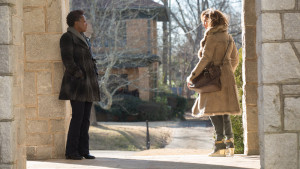With Miami in film festival mode again–Miami Film Festival’s GEMS and OUTshine happening at the same time–it’s time to get back to capsule writing again. Some words on films I’ve seen this month ended up in the Miami New Times (which collects Beats Per Minute, The Untold Tales of Armistead Maupin, and Saturday Church) and the rest are popping up over here. Some of the included capsules were also simply films I’ve seen in the last month and are being lumped in with the rest.
—

Gerald’s Game
Mike Flanagan’s obsession with the trauma of youth will never grow boring to me as long as he keeps up with his immaculate editing and stories that give underutilized actors a chance to perform at their best. Carla Gugino and Bruce Greenwood are both stellar, each one delivering exactly the personas they need at any given moment (shame they’ll be robbed come award season due to distribution). The shifts from innocuous to aggressive or from defeated to determined are gold.
Gerald’s Game, adapted from a Stephen King novel of the same name, proves that one can adapt the writer in 2017 and not fail miserably (as both The Dark Tower and It did for me). Where many complain about the abruptness or misguided nature of the ending, it provides an optimistic perspective to the pessimism of Oculus, which serves as a perfect companion film. Shifting between decades, limiting the cast and interactions, and giving the audience a film that toys with the notion of what is real and what isn’t. It’s a film that shows maturity.
From Oculus, where trauma is inescapable, to Gerald’s Game, where trauma can be overcome, I see a wonderful growth in Flanagan as a storyteller. Sure, he’s got a good framework with King’s novel, but he treats the material (and the protagonist) lovingly, never once exploiting the past or present situation of a woman for cheap thrills.
Gerald’s Game is currently available to stream on Netflix Instant.

The Feels
Jenée LaMarque’s The Feels introduces a number of human beings going through the motions at a lesbian bachelorette weekend. Things, as expected, go wrong, but this happens at a glacial pace, with the film diving into the supporting characters and their own dramas just as much as the protagonists. It would be something if the cast, featuring the talented Constance Wu and Angela Trumbur as the main couple, Andi and Lu, had more to do than engage in these often awkward and uninteresting conversations. But LaMarque tries to balance too many plates instead of focusing on the best narrative: the fact that Lu has never had an orgasm and Andi is having trouble dealing with that.
Moments of intimacy between the two work beautifully and feel necessary, exploring the way this reveal has become a reason to explore whether this relationship works at all. But The Feels, unfortunately, is too concerned with being about more than these individuals, cutting away to talking-head documentary scenes with every single character discussing orgasms, among other unnecessary quirks. The movie wants to be too many things and, as such, ends up being a frustrating experience one wishes would have been condensed into a short romantic dramedy film about the women at its core.
The Feels was seen as part of OUTshine Film Festival.

Dream Boat
Dream Boat is the kind of film that wants to have its cake and eat it too, simultaneously indulging in the very superficiality it seeks to explore and critique. Director Tristan Ferland Milewski delivers a high-style documentary about a cruise ship that sails once a year and provides an escape for thousands of gay men from everything from the banality of life to repressive societies in which they can’t be themselves. At its best, Milewski’s camera follows its diverse subjects through a series of parties that some take delight in and others find tiresome and isolating. There’s a certain fascination that comes with seeing the contrasting perspectives between a number of individuals: the scantily-clad muscle boy who wants love, the optimistic HIV+ photographer, the disabled partnered man who seems to enjoy life more than most others, and quite a few others.
But for all the uncensored oral sex and bouncing tight asses on display–framed gorgeously to the point where it feels too staged at times–the melancholic score and constant musings on whether all of this superficiality is authentic grows frustrating. What seems like a wide range of perspectives at first quickly devolves into a series of voiceovers and conversations that feel like a stark contrast to the sex-positive and wonderfully open atmosphere that the on-board parties feature. Snippets of discussion on how the gay community treats bodies that aren’t up to par, sexual monogamy, the concept of passing as straight being the ultimate goal are all important, but they come across as intensely negative in a film exploring an event where many find happiness.
“We all look the same,” one passenger says, confronted with wondering whether or not he has an identity amidst the muscles and beards. He dons a Sia-style wig to hide himself and hopes to become invisible, to be noticed for something other than his looks. Dream Boat has a lot to say about gay culture, almost too much for one film. But by gazing at the ripped masculine bodies of a portion of the cruise passengers instead of diving into just how positive and life-affirming some of the parties can be, it delivers mixed results.
Dream Boat was seen as part of OUTshine Film Festival.

Professor Marston and The Wonder Women
As conventional as Angela Robinson’s film might seem when it comes to form and biopic framing device (interview and flashback), it actually proves to be beautifully subversive in its simplicity. The telling of a queer, polyamorous narrative in the mold of a romantic drama, focusing primarily on this relationship instead of Wonder Woman, is groundbreaking. To think that this, a film that so clearly outlines the progressive views of a partnership from the 30s/40s/50s (while, obviously, removing some of the more unsavory aspects of their lives) and presents an understanding of everything that made Wonder Woman so unique because of its creators, is getting a wide release is astounding to me. Submission is essential. Dominance can shift. Violence is unnecessary. Women are powerful.
It never neuters the sexuality of its characters, and never exploits them either. Rebecca Hall, Luke Evans, and Bella Heathcote feel keenly aware of their characters’ mixed emotions. Their combined talent and chemistry creates an ensemble piece to be reckoned with, and Robinson is so attuned to how bondage, without explicit sex, can be the most erotic thing in the world. A rope against skin, the feeling of dominating and of being dominated, of giving yourself up to someone, knowing that you’re safe in that moment and that this is all you’ve ever wanted.
As such, Professor Marston and the Wonder Women ends up being a film that queers history while understanding the politics and sensibilities of Wonder Woman better than the film that placed her front and center this year.
Professor Marston and the Wonder Women is currently in theaters everywhere.

Paris Can Wait
“Ann, you’re human, and you’ve been to the depths of what that means.”
One of the most wonderfully casual movies of the year. Doesn’t always hold one’s interest and it’s as slight as everyone complains, but that’s not necessarily a bad thing. The jazzy score makes for an absolutely wonderful complement to the journey on screen and Diane Lane makes for such a lovely screen presence. She’s got real chemistry with Arnaud Viard, even when he’s going on and on about wine or food.
It’s a fun, simple journey through France, where director Eleanor Coppola seems as fascinated with every little thing–be it art or food or nature–as the protagonist is. The way she inserts amateur photographs throughout the lovingly-shot streets and restaurants and hotel rooms of France is a bit off-beat and, admittedly indulgent, but fitting of a character who wants to see life through a new lens.
Some of its dramatic beats feel a little forced, but others (especially that of Lane discussing an emotional past trauma) are exceptionally handled. I’m especially fond of the way Coppola handles the relationship between the protagonists without any hang-ups or unnecessary melodrama. A kiss is a kiss. Une femme est une femme.
Paris Can Wait is currently available for rental or purchase online.

XX
Every anthology has its perks and faults. With XX, there’s four short horror stories directed by four women: Roxanne Benjamin, Annie Clark, Karyn Kusama, and Jovanka Vuckovic. As a complete work, it’s as interesting as it is frustrating, with none of the stories feeling overwhelmingly connected by theme, content, or execution. Its stop-motion framing device is gorgeous and lightly reminiscent of Jan Švankmajer in the best way, but it’s a shame the works couldn’t mirror that. The only thing that three of the four have in common is motherhood, which seems somewhat limited. .
Vuckovic’s “The Box” feels like a bite-sized Twilight Zone that dedicates itself to restrain in narrative, performance, direction, everything. It doesn’t quite go anywhere, but it takes glee in creating an atmosphere of mystery by keeping information from the audience. Its self-betrayal happens in its last lines, “I’m hungry,” something too on-the-nose for it and simultaneously not enough of a hook for a story that’s entirely based around people not eating because they looked in a box. Benjamin’s “Don’t Fall” is the most conventional of the bunch, complete with every bit of ridiculous low-budget death one might expect from a short horror film. The slightly annoying characters come with the territory and there’s some fun to it, but nothing that screams memorable.
Where the film flourishes is in Clark and Kusama’s segments. Clark’s “The Birthday Party” has no interest in scares, unless your greatest fear is watching someone anxiously struggle with party planning or hiding a body. A certain Lynchian humor blended with Melanie Lynskey’s stellar performance shows that Clark is a filmmaker to look out for, even though its abrupt ending leaves you wishing it’d gone on. As for Kusama’s “Her Only Living Son”? It’s a conceptual masterpiece—essentially what would happen to Rosemary and her baby—that feels too short. Another abrupt ending neuters all the emotional power of Christina Kirk’s wonderful work here, reminiscent of Essie Davis’ pained motherhood in The Babadook.
XX is currently available for streaming on Netflix Instant.



 Derek
Derek
 Isabelle
Isabelle